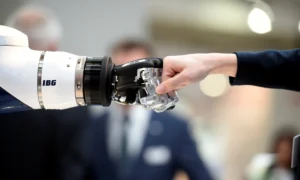Global AI in the healthcare market size reached USD 7 Billion in 2021 and is predicted to register a revenue CAGR of 46.7% during the forecast period. Market revenue growth is predicted to be driven by factors like rising demand for IT services and AI-driven solutions from the healthcare sector and increasing investment to modernize the overall healthcare system using state-of-art technologies in various countries. Revenue growth of the market is additionally being driven by increasing dependency on clinical data to facilitate better healthcare services and rapid advancements in specialized AI chips for faster processing of health-related data and information.
Demand for IT services from the healthcare sector to supply more advanced solutions and diagnosis and prognosis has been increasing, and therefore the trend is predicted to continue going ahead. The number of IT companies developing AI-based solutions for the healthcare industry has also been increasing in the recent past. Health information systems with AI integration can help healthcare personnel to reinforce health information management and operate with minimal errors and ensure compliance with regulations, besides offering other advantages. It also can contribute to the rapid modernization of healthcare facilities and facilitate digital transformation, improve virtual care and services, and simultaneously improve productivity and profitability of public and personal healthcare organizations. AI is often incorporated with various IT services to initiate automation and improve precision. For instance, the Electronic Health Record system enables healthcare professionals to record patient data and facilitates information sharing with other healthcare organizations. AI is often wont to collect structured and unstructured data silos within the healthcare sector through interoperability, permit tracking of patients’ EHR data over time, and predicts the potential risk of developing different diseases. In addition, AI technology is capable of higher detecting major abnormal findings like lung nodule and consolidation in chest X-ray images. AI tools are being developed to enable radiologists to simply and quickly identify abnormalities and bone fractures etc.
Increasing investment to modernize healthcare systems using state-of-art technologies is additionally expected to still drive demand for AI in healthcare systems. Governments of varied countries have increased investment to upgrade existing healthcare facilities. Moreover, developing countries are introducing conducive policies to facilitate foreign Private Equity investments. For instance, the Indian government has announced financial incentives to spice up private investment in healthcare to market India as a cheap destination for healthcare services for patients from abroad. Integration of AI in health information technology can help to leverage the info which will address challenges like feasibility, accessibility, and quality-related to delivering quality patient care in a value-based environment, also as provide decision-making support to healthcare professionals.
Get a glimpse of the in-depth analysis through our Report Sample



































